
A Love for Print and Paper: Used and Antiquarian Books in Japan
Exploring Jinbōchō’s Secondhand Bookstores
Guide to Japan Society Culture Lifestyle- English
- 日本語
- 简体字
- 繁體字
- Français
- Español
- العربية
- Русский
Many locations around the world are known for their secondhand bookstores, including Paris’s Latin Quarter, Charing Cross Road in London, and Hay-on-Wye in Wales. The biggest such district is said to be Jinbōchō in Tokyo, though, with some 130 stores clustered broadly around the crossroads where Yasukuni-dōri meets Hakusan-dōri.
While Jinbōchō is also known for its curry and coffee shops, I wonder how many book lovers drop in casually at a bookstore after a curry lunch. It may require some courage to enter the more established stores, which have been there for generations.
A good time to get to know the area is during the book festivals in spring and autumn. I made my way there during the Spring Secondhand Book festival in March, visiting stores along Yasukuni-dōri that caught my fancy.

Vendors line the sidewalks of Yasukuni-dōri at the Spring Secondhand Book Festival. They include some dealers who usually only do business online, like Komodo Books, which handles volumes related to topics such as film, manga, and anime. (© Nippon.com)
Jinbōchō Old-Timers
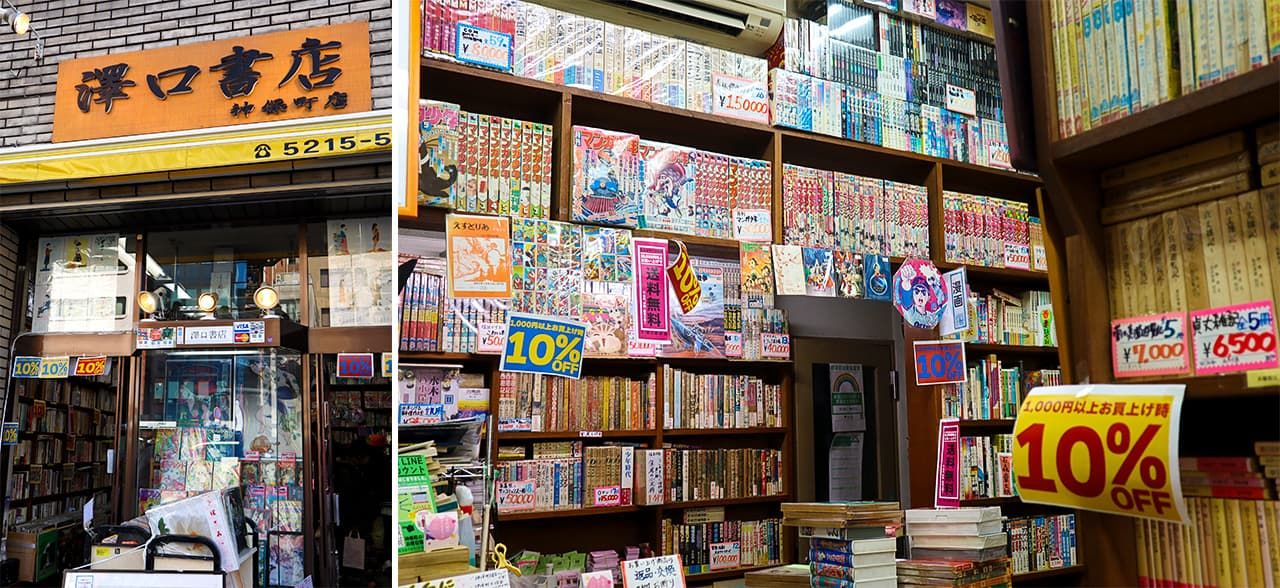
Sawaguchi Shoten’s Jinbōchō Store specializes in manga. (© Nippon.com)
Sawaguchi Shoten has three outlets in the area, each with a distinct identity. The one named Jinbōchō Store specializes in manga; following the death of Toriyama Akira in March, it produced a tribute display consisting of a complete set of Dragon Ball and editions of Weekly Shōnen Jump with Dr. Slump featured on the cover. The walls of the small store are packed with out-of-print manga books.
The second, Ganshōdō Building Store, has a wide range of bunkobon paperbacks, while the nearby Tokyo Kosho Store focuses on books about the arts, including music, fine art, film, photography, and architecture. Customers who spend ¥500 or more at any of the three stores can receive a free freshly brewed coffee in the relaxation space on Tokyo Kosho’s second floor.
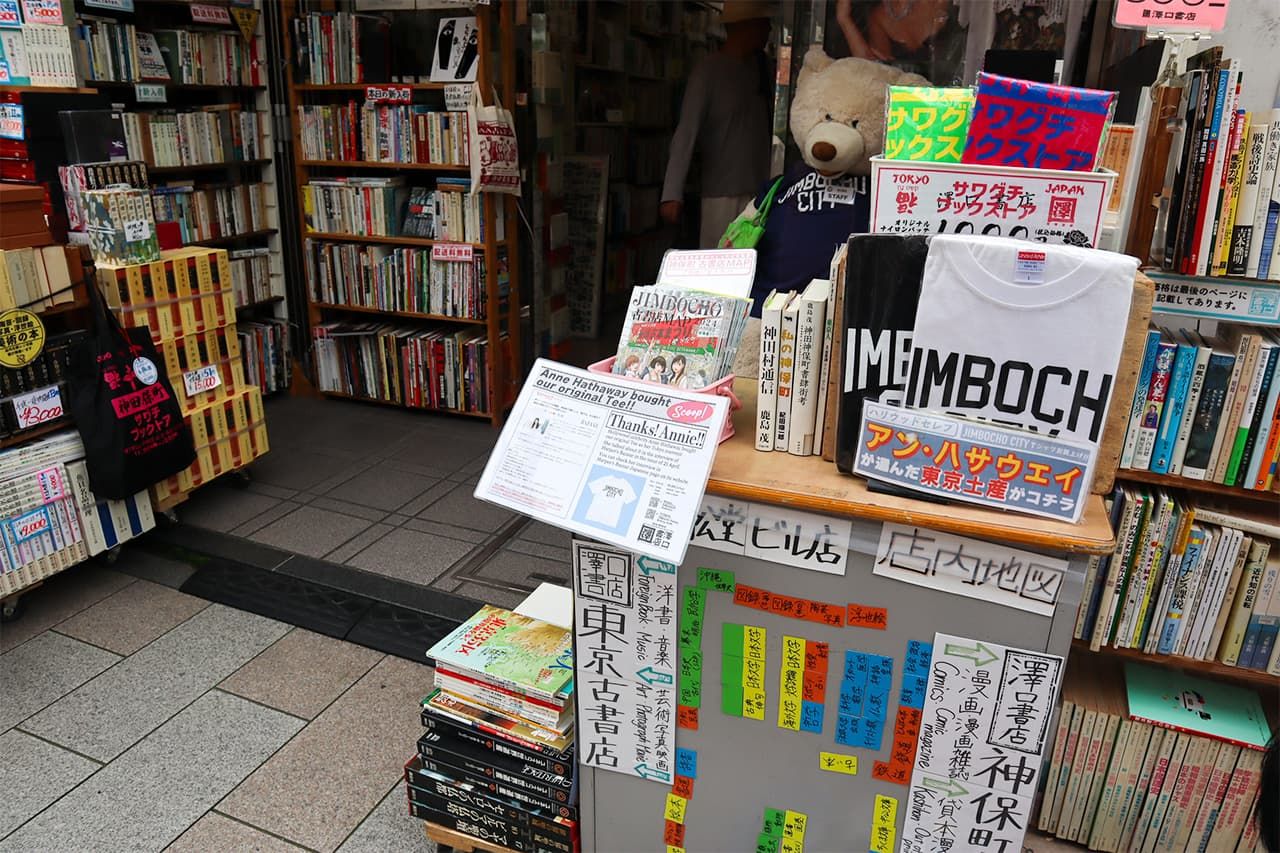
A sign outside Ganshōdō Building Store advertises T-shirts, informing visitors that actress Anne Hathaway is among the customers to have picked one up. (© Nippon.com)
Sawaguchi Shoten also sells original merchandise. When Hollywood star Anne Hathaway came to Japan in 2023, she apparently snapped up a souvenir T-shirt.
Several stores have been in operation for more than a century. The district’s oldest is Takayama Honten, founded in 1875. It is known for works in such fields as traditional theater, martial arts, and food, as well as its close association with major authors; the historical novelist Shiba Ryōtarō acquired reference materials for his writing there.
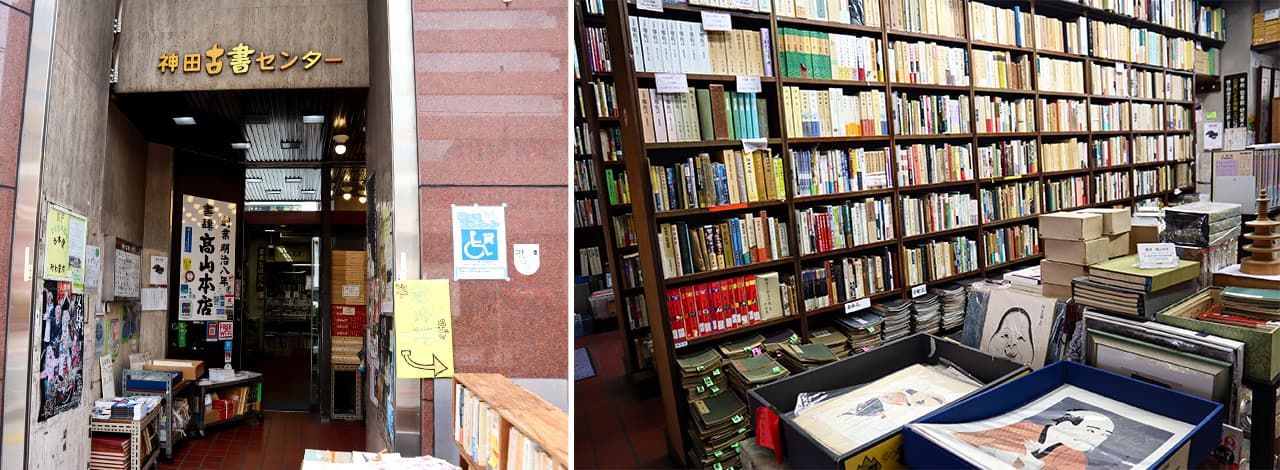
Takayama Honten is located on the first floor of Kanda Kosho Center Building. (© Nippon.com)
Ohya Shobō, founded in 1882, deals with all genres published in the Edo period (1603–1868), including a wide range of popular literature, as well as ukiyo-e woodblock prints. Kōketsu Kuri, the fourth-generation owner, is building a collection of wahon (traditional Japanese-style books) on the topic of the supernatural creatures known as yōkai, and there is a pile of catalogues introducing 321 such works from the Edo period.
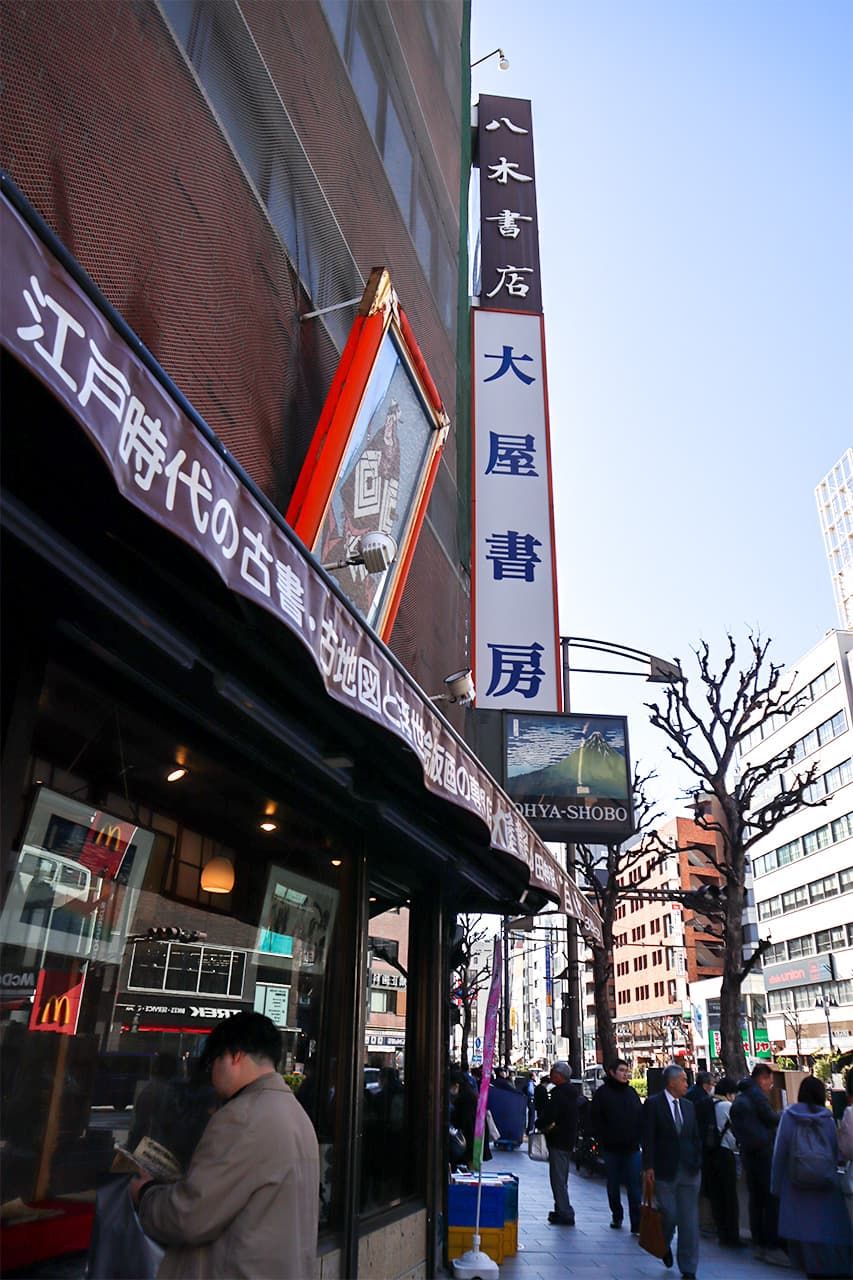
Ohya Shobō in Jinbōchō. (© Nippon.com)

The interior of Ohya Shobō with yōkai catalogues piled up to the right. (© Nippon.com)
Isseidō Shoten, founded in 1903, handles all kinds of traditional Japanese books, old maps, and foreign books. Its customers include the National Diet Library, other public and private libraries, and art museums, as well as overseas institutions like Harvard University, Cambridge University, and the British Library. Japanese books are on the first floor, but climb the marble staircase and the foreign books section catches the eye with works on Japan and elsewhere in Asia, and much more, even including books on ancient Greece and Rome. Just examining the spines feels like a journey around the world and back through time. There is also an extensive selection of books on Western and Asian art.
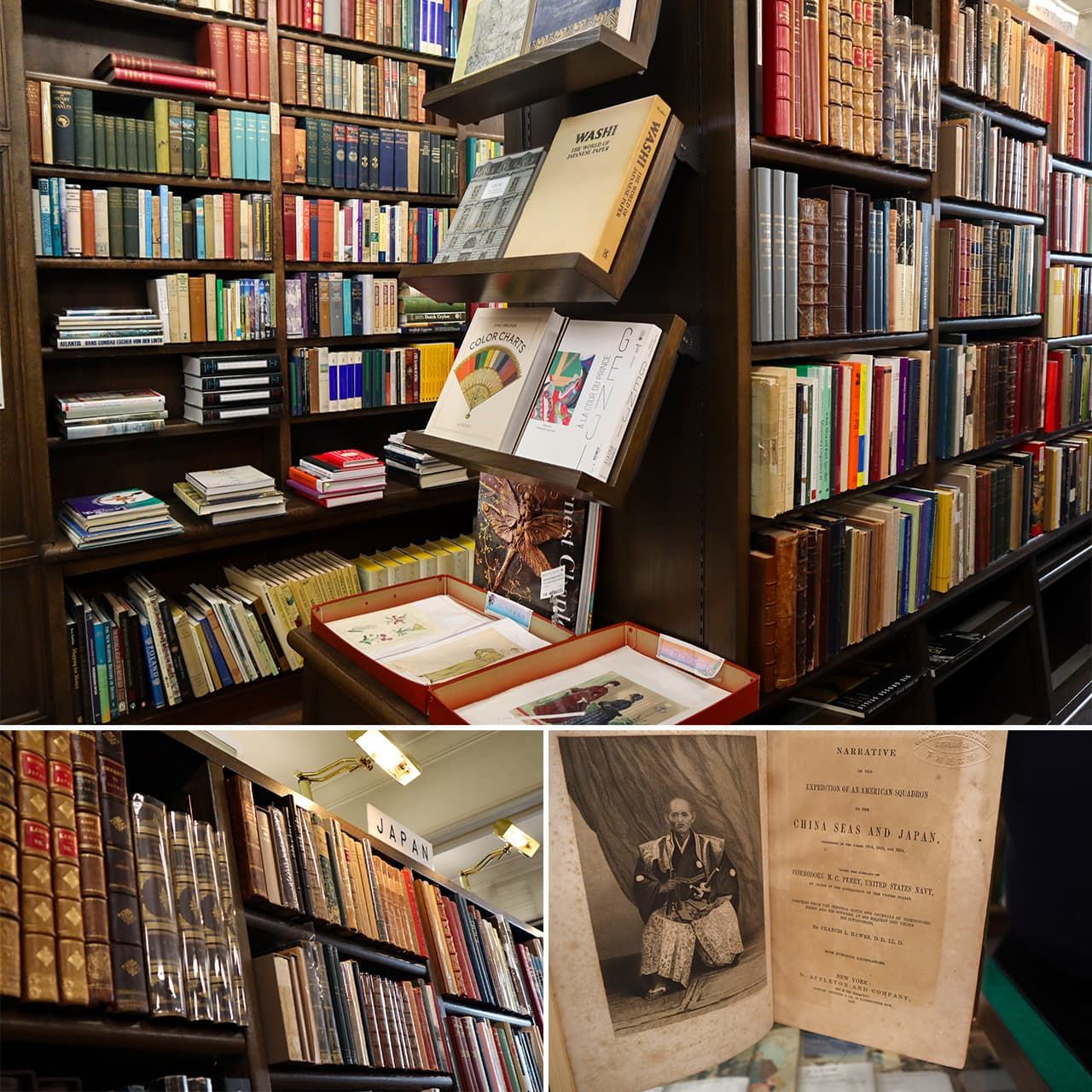
The foreign books section on the second floor of Isseidō Shoten. The Japan shelf (bottom right) displays an 1856 edition of Narrative of the Expedition of an American Squadron to the China Seas and Japan, a record of the voyage of Commodore Matthew Perry. (© Nippon.com)
Jimbōchō Book Center stands at the former location of Iwanami Shoten. Initially a bookstore, Iwanami grew to become a major publisher. Its books still line the shelves of the book center, which also houses a café and a coworking space. At the top of an external staircase is the entrance to Shinsendō Shoten, founded in 1907. It has a large collection of old maps, and specializes in books related to railways and industrial history. Reasonably priced old postcards are on sale from around ¥500, making it a good place to buy gifts.
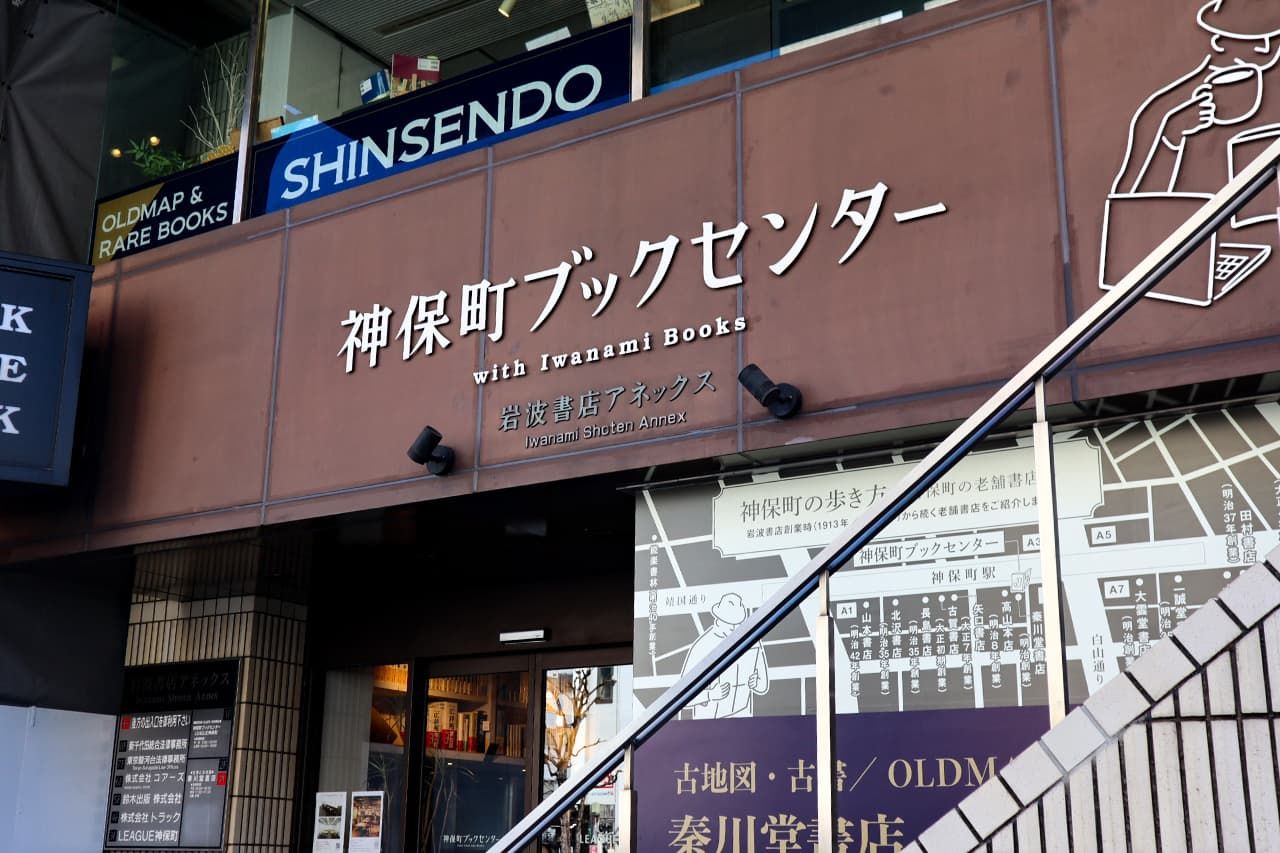
Jimbōchō Book Center with Shinsendō Shoten on the second floor. (© Nippon.com)

Some of the goods for sale inside Shinsendō Shoten. (© Nippon.com)
Two Kinds of Experience in the Kitazawa Building
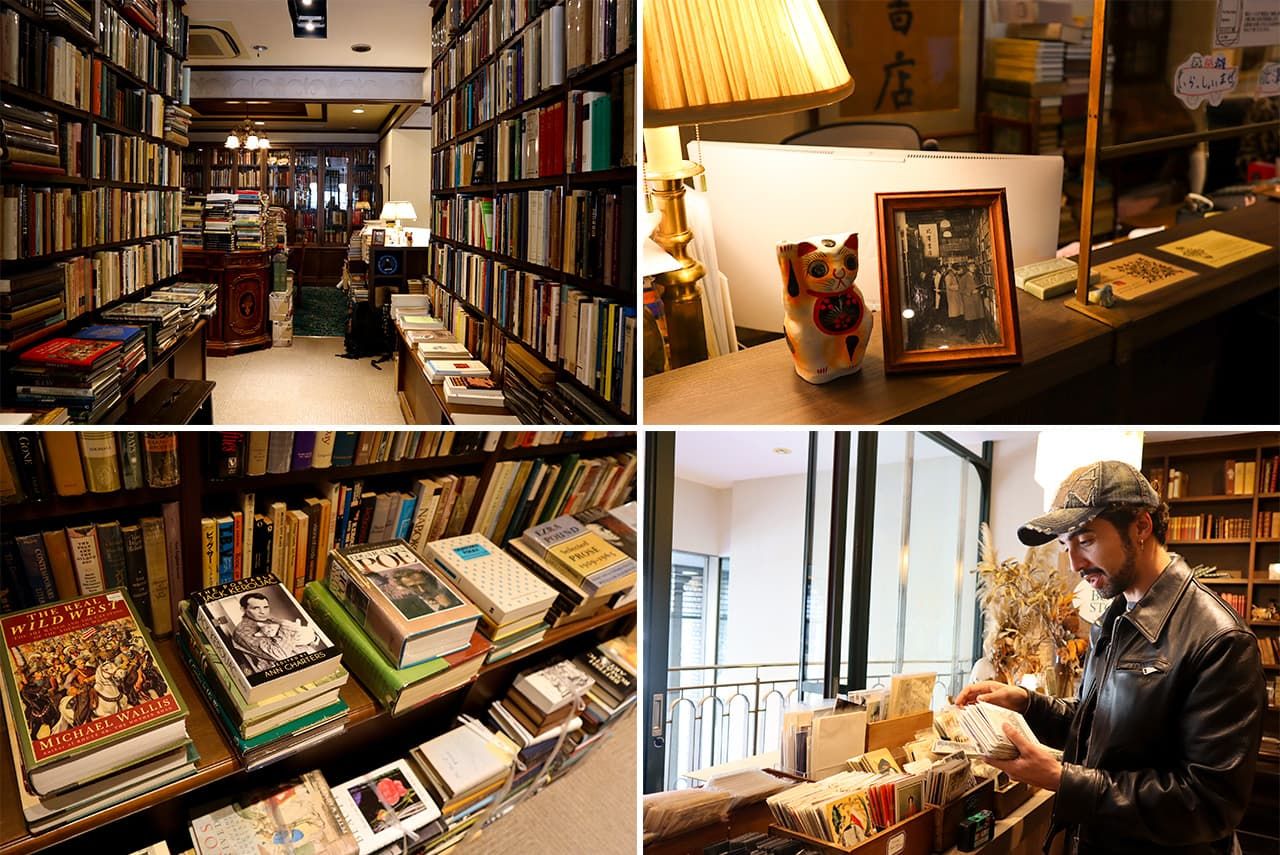
Kitazawa Shoten displays a photograph (top right) of the store at the time it was managed by its founder, Kitazawa Yasaburō. (© Nippon.com)
Kitazawa Shoten, founded in 1902, can be found on the second floor of the Kitazawa Building. It has the atmosphere of a magnificent study, containing more than 10,000 books related to the liberal arts, with an emphasis on British and US literature. Several customers take their time to move around the store, scrutinizing the books as they go. One of them is Maximiliano Lara (pictured), a young Chilean who has come from Melbourne. It is his second trip to Japan, but his first to Jinbōchō. He examines the bookplates and antique cards and postcards, seemingly on the hunt for the perfect souvenir.
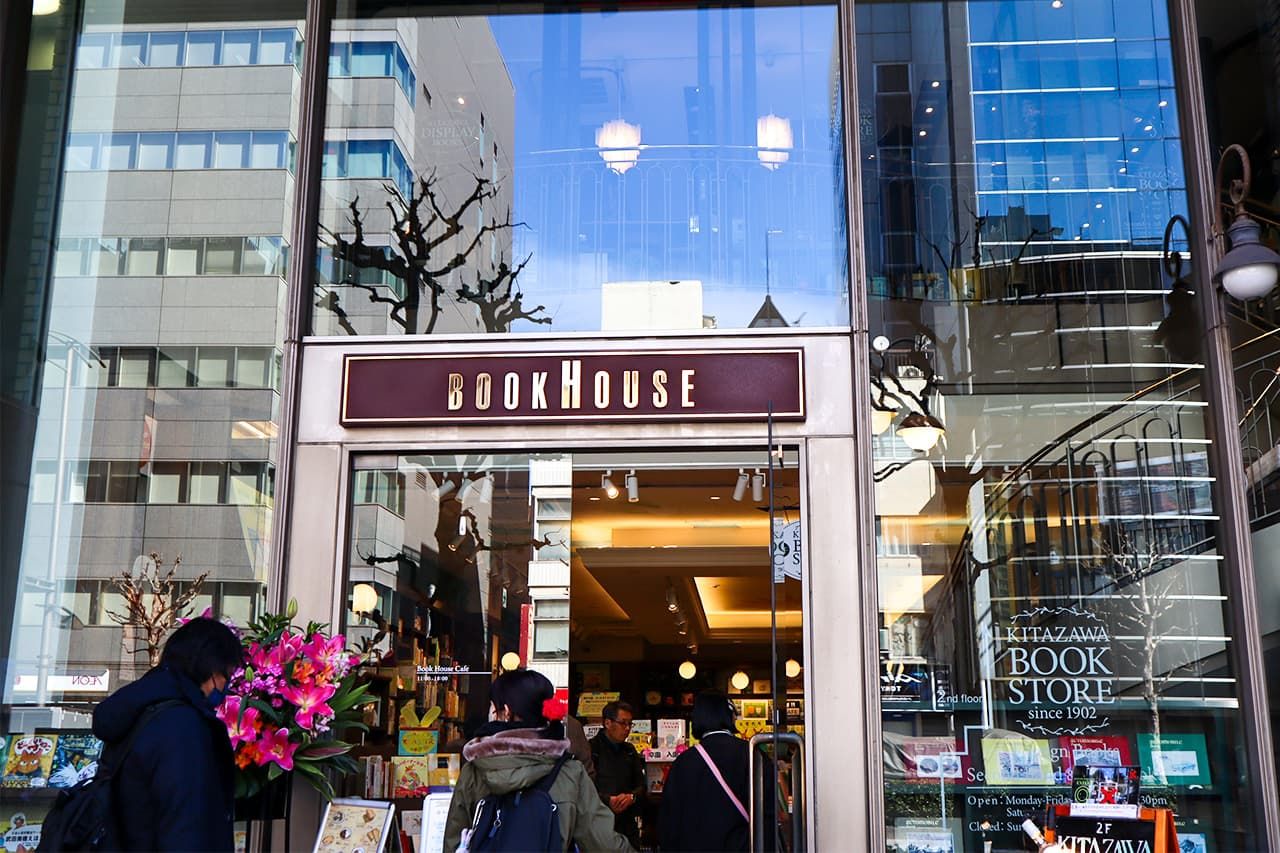
The entrance to Book House Café. Kitazawa Shoten is on the second floor. (© Nippon.com)
Book House Café is on the first floor of the Kitazawa Building. It specializes in children’s literature, with inventory of around 12,000 books and picture books, ranging from the latest publications to older rare editions. It hosts events like exhibitions of the original illustrations for picture books and kami-shibai performances, in which narrators tell stories while holding a series of picture cards. The café inside serves curry and other items, while there is also a small bar at the back called Lilliput, which is open from eight in the evening.
A Detour for Cats
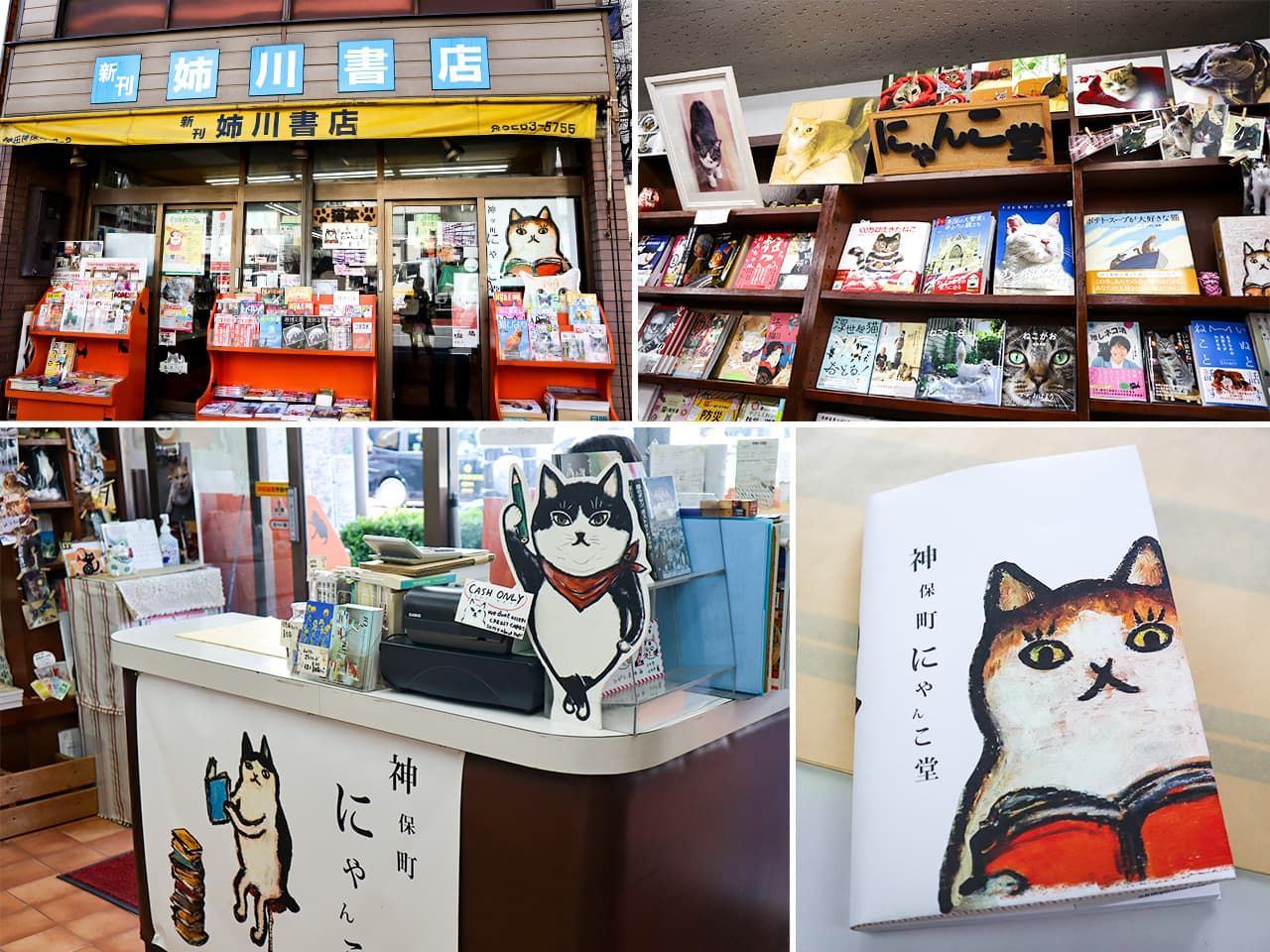
Cats are the main theme at Anekawa Shoten. Customers who purchase books can receive covers for them with an original design by author Kumakura Tamami of a cat enjoying reading (bottom right). (© Nippon.com)
Right next to the Jinbōchō crossroads, along Hakusan-dōri, I come to a sudden halt when I see Anekawa Shoten, a store specializing in cat books. It has more than 600 books on the topic and does not discourage visitors from reading without buying. It only stocks new books, so does not fit into a secondhand bookstore tour, but it is a must for cat lovers.
Shelf Stores
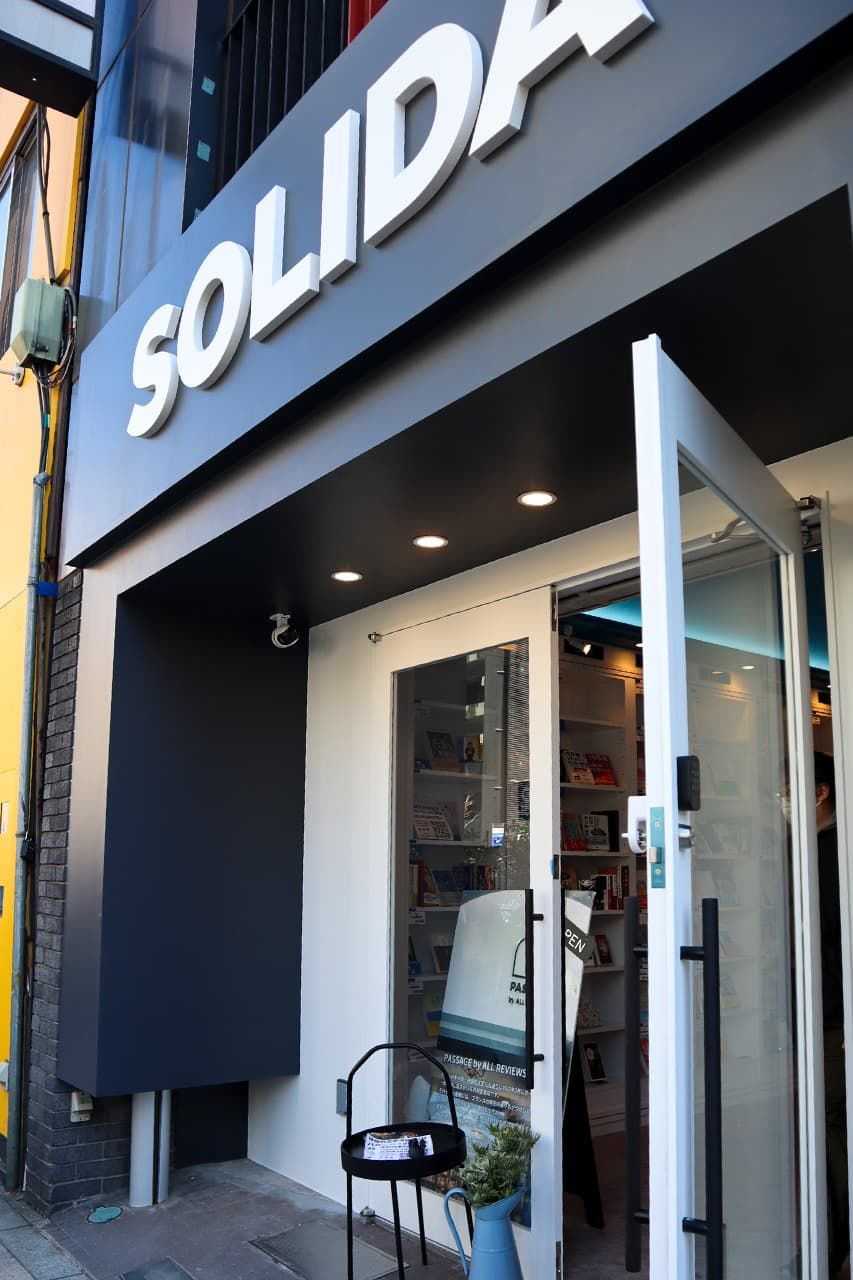
The exterior of Passage Solida. (© Nippon.com)

A look inside this innovative bookstore. (© Nippon.com)
In March 2024, Passage Solida opened near the Jinbōchō crossroads. This is a shared-space bookstore produced by Kashima Shigeru, a specialist in French literature and antiquarian book collector. The shelves are named after real streets in France and are available to rent.
For a ¥13,200 membership fee and from ¥5,500 per month, renters get a shelf on which they can freely choose to sell new or used books, setting their own prices. After the first Passage store opened two years ago on Suzuran-dōri behind Yasukuni-dōri, applications to be renters flooded in. It seems that many people are keen to have their own small “bookstore.” I could not help wondering what books I might include on my own shelf.
Visitors from Around the World
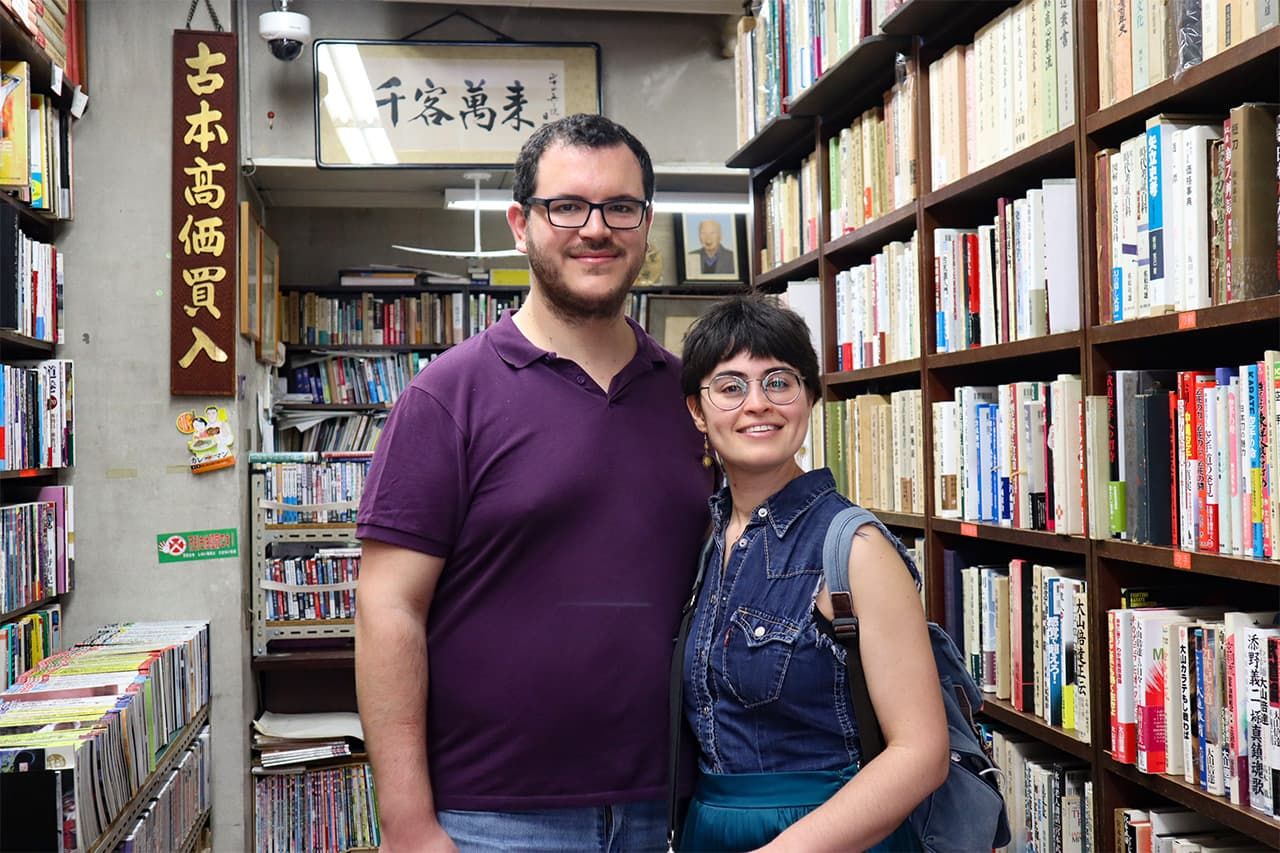
Visitors from London at Takayama Honten. (© Nippon.com)
There are of course plenty of Japanese shoppers, but Jinbōchō draws in visitors from around the world. During my visit at the end of April, I spoke to a couple from London who were absorbed in examining the books in Takayama Honten, having come to the area on the second day of their first trip to Japan. Christina Martin explained that she herself works in a bookstore specializing in children’s books. They were charmed by the atmosphere of the stores with long histories.
Jinbōchō is an essential stop for bibliophiles in Tokyo, and the Book Town Jimbou website acts as an excellent guide. It has search functions for stores and secondhand books as well as showing panoramic views of store interiors and providing walking maps and other useful information.
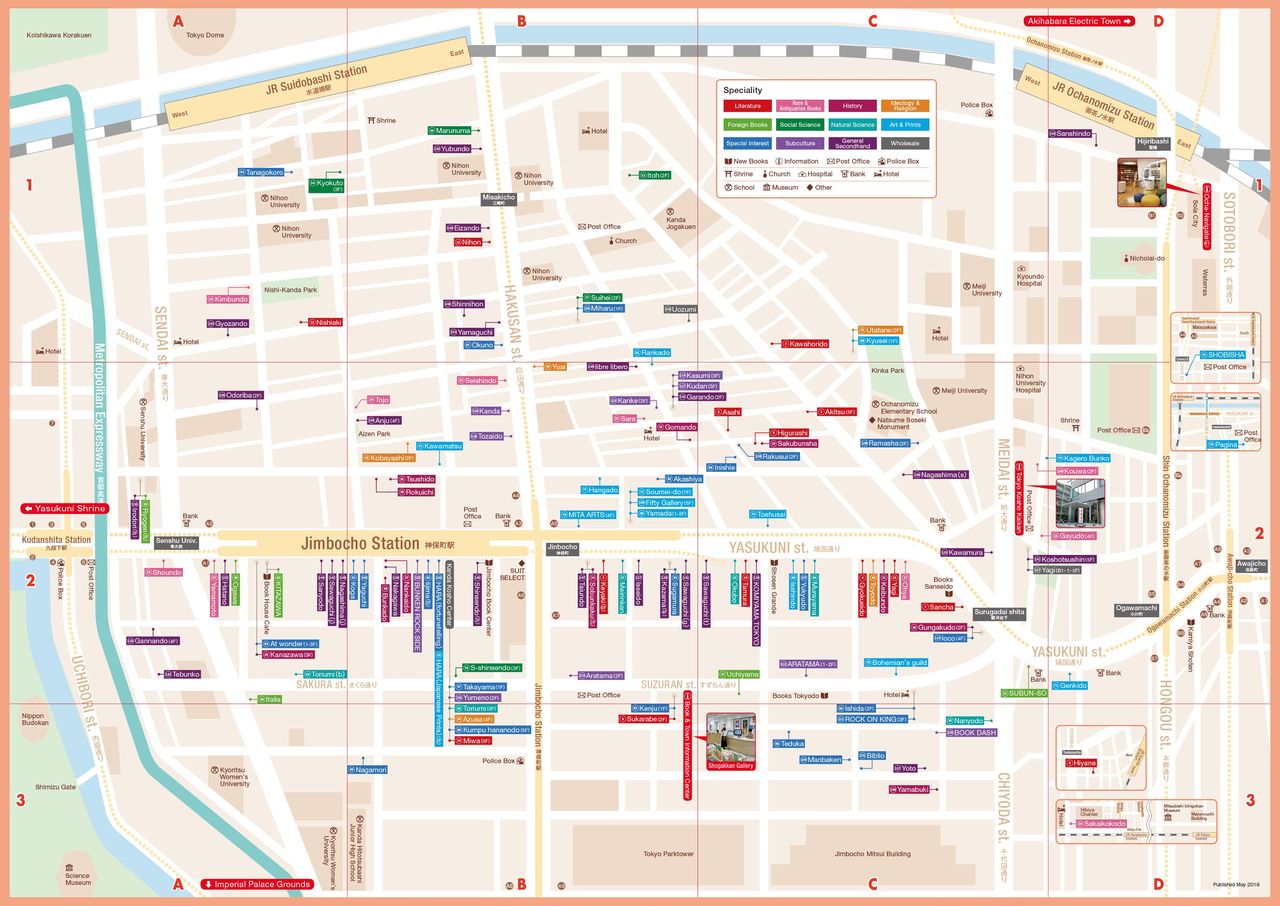
Courtesy Book Town Jimbou. Map of secondhand bookstores in Jinbōchō.
(Originally published in Japanese on May 8, 2024. Text by Itakura Kimie of Nippon.com. Banner photo: Customer Maximiliano Lara in Kitazawa Shoten, Jinbōchō, Tokyo. © Nippon.com.)
